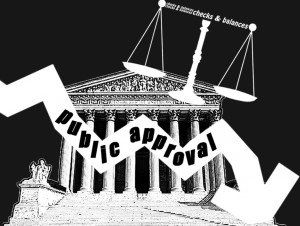Public perception does not define Court
A survey released Monday revealed a dismally low approval rating for the Supreme Court among the American public. The survey, released by the Pew Research Center for the People and the Press, came just days before the Supreme Court was set to begin hearing two highly anticipated cases regarding gay marriage.
Though some might view the results of the survey in a negative light, it is actually a sign that the Court is carrying out its original duty to make decisions based on legal reasoning — without concern for public opinion.
According to the survey, only 52 percent of Americans approve of the highest court in the nation, while 31 percent disapprove. The current approval rating marks a mere 1 percent increase since last July, when the lowest approval rating since 1985 was recorded.
Instead of signifying the collapse of the Supreme Court’s legitimacy, these low numbers should provide hope that there is a healthy separation between the judiciary and the more political branches of government. After all, anyone who paid attention in 5th grade social studies could tell you that the judiciary was meant to protect the nation from unchecked government power.
Partisan grumbling over what is supposed to be an inherently nonpartisan institution is normal and could perhaps even be seen as a positive. If all Republicans were happy with the decisions of conservative-leaning justices, such as Chief Justice John Roberts, and Democrats with the decisions of more left-leaning justices, such as Justice Ruth Bader Ginsberg, it would indicate a dilution of the impartiality of the law by the justices’ personal politics.
According to the same survey, though, this is not currently the case. About the same percentage of conservative Republicans consider the Court to be liberal as liberal Democrats consider the Court to be conservative (45 and 48 percent, respectively).
In the political realm, the idea of an “activist court” is disparaged as a threat to the very institution of the judiciary. Former Republican presidential candidate Newt Gingrich drew a lot of attention in the last election cycle for his pledge to reign in misguided judicial decisions, for example. Gingrich controversially proposed a policy of judicial review that would allow Congress not only to subpoena individual judges but also to eliminate whole courts if they made certain decisions considered unfavorable.
Such a proposal was problematic in its implications for the separation of powers doctrine that functions to protect the American government from such capricious action. The point of the courts is not subjectivity, and any interference from other branches based in political ideology would be corrosive to the buffer that the courts provide. Clearly partisan decisions within the judiciary could deliver a deathblow to the institution if allowed to occur unchecked.
Thus, the recently reported approval ratings suggest that such partisan decisions are not currently a significant problem. The evident confusion among the public as to which way the current Supreme Court actually leans also suggests this. The only consistency that court observers should be able to see when it comes to judicial decisions is in legal reasoning, not political opinion.
The purpose of lifetime appointments for justices is that they will not face the crippling pressure of re-election. In other words, they are free to do their work without worrying whether what they decide will negatively impact them maintaining their position. They have no constituents to impress and no votes to lose.
As the Court hears oral arguments this week on cases regarding gay marriage, it is important to remember that justices’ jobs are not to be political figureheads, but to impartially apply the law to current situations.
The Supreme Court is far from flawless, and it would be unreasonable to think that its justices are completely unbiased and that their thinking is not influenced by their political affiliations. But though it is imperfect, the Supreme Court should be lauded for its recent tendency to blur the political lines and defy expectations when it comes to its decision-making.
Sarah Cueva is a junior majoring in Middle East studies and political science. Her column “Homeland” runs Wednesdays.

